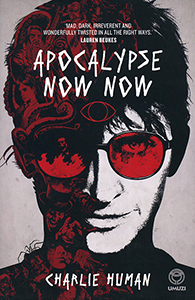

Vietnam War films, the frontier and the mythģFollowing John Fitzgerald Kennedy’s claim that the challenges faced by modern Americans represented a “New Frontier” (1960), the major events of the 1960s tended to be viewed through the lens of the mythical reenactment of the great pioneer spirit of American frontiersmen.
CHARLIE HUMAN APOCALYPSE NOW NOW VIMEO FULL
In other words, instead of criticizing the nefarious influence of America’s mythical perception of the war-a theme that had already been explored for more than a decade before the release of Full Metal Jacket-Kubrick’s film examines the endurance of the myth as a lens through which one still shapes one’s reality, in spite of its obvious inadequacy.

In so doing, Full Metal Jacket questions the failure of the countercultural anti-frontier mythology of the 1970s and takes into account the 1980s’ neo-mythical approach of the war, by suggesting that the frontier myth, although criticized and devalued, has survived and even gained strength as pure representation.

I will argue that by becoming the film’s topic, the mythical weight of the war is approached through a reflexive lens that strives to prevent myth from structuring the movie’s narrative, to keep it at bay by, paradoxically, acknowledging its overwhelming influence in the shaping of one’s view of reality. By having Private Joker (Matthew Modine), the film's main protagonist, invoke John Wayne in his very first line-“Is that you John Wayne? Is this me?”- Full Metal Jacket summons the myth of the frontiersman Wayne came to embody, and in this respect reworks a firmly established intertextual relation, one that Wayne himself helped construct by transposing both his WWII soldier and frontiersman persona in Vietnam with his 1968 pro-war film The Green Berets.Ģ According to John Svendsen, Full Metal Jacket, unlike its predecessors, is characterized by a “total absence of myth-making presents a radical critique of war movies” (1989). Full Metal Jacket has been seen as a mere Kubrickian recycling of what had then become an established Vietnam iconography, whose most prominent characteristic is arguably the depiction of Vietnam as a metaphoric space, a New Frontier faced by a new generation of Americans. Released almost a decade after Michael Cimino's The Deer Hunter (1978) and Francis Ford Coppola’s Apocalypse Now (1979), Kubrick’s film even came after a new trend of 1980s Vietnam films such as the Rambo franchise or Oliver Stone’s Platoon (1986). However, when in 1987 the director released his own take on the Vietnam War, influential American critic Roger Ebert considered that “this isn't a bad film but it‘s not a great film and in the recent history of movies about Vietnam Full Metal Jacket is too little and too late" (Ebert 1987). Yet before Full Metal Jacket, none of them was ever accused of being uninventive. 1 Upon their release, Stanley Kubrick’s films were often misunderstood and only acquired a cult status in the long run.


 0 kommentar(er)
0 kommentar(er)
